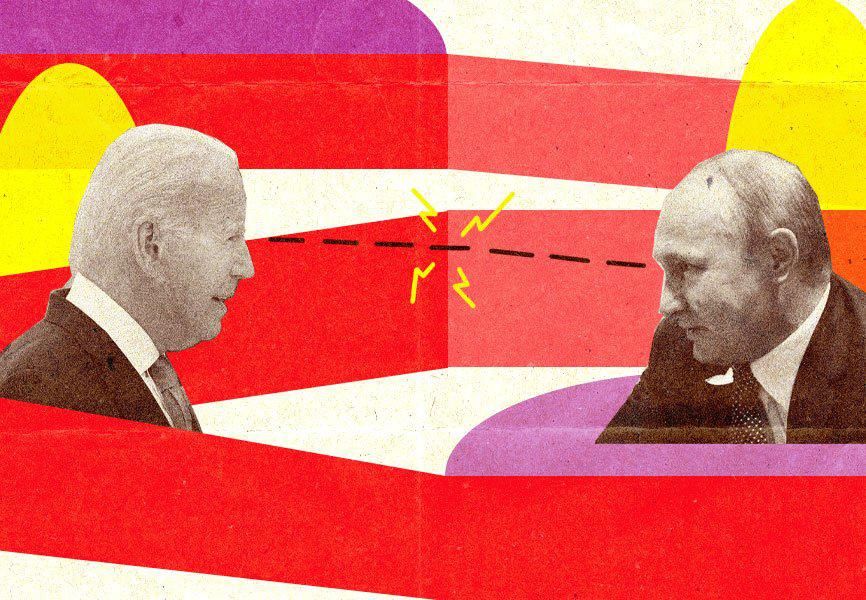Amid mounting fears of a war between Russia and Ukraine, US and Russian representatives will meet in Geneva on Monday to discuss security issues, including NATO expansion and the recent Russian troop buildup on the border with Ukraine. Russia and NATO representatives will also meet in Brussels on Wednesday about the same tensions, with further talks in Vienna on Thursday hosted by the Organization for Security and Cooperation in Europe. We asked Jason Bush, senior analyst at Eurasia Group, what has prompted the flurry of meetings, and what can be expected from them.
What do the parties aim to achieve?
It is unclear how exactly the idea of these talks originated. Russian leader Vladimir Putin said the offer came from his US counterpart Joe Biden. If so, this was in response to Russian demands for its security concerns to be addressed. What’s clear is that the talks are an outgrowth of recent US-Russia diplomacy aimed at stabilizing relations, as well as a response to the Russian troop buildup now causing alarm in the West.
Russia has demanded security guarantees in relation to NATO expansion to Ukraine, both in terms of future NATO membership and military deployments. If the demands are to be taken at face value, then Russia’s aim is to put a complete stop to NATO’s eastward expansion, guaranteed by a formal treaty.
It remains to be seen, though, whether this is a correct interpretation of Russia’s goals, or whether it would in practice settle for something less. From the point of view of the US and NATO, the aim of the talks is not to stop NATO expansion but to mitigate Russia’s concerns about it and to de-escalate Russia-Ukraine tensions.
These are maximalist demands from Russia — can Putin climb down from them?
They might appear to greatly limit Russia’s room for maneuver. Yet the common view of Putin — as someone who is inflexible and incapable of compromises or retreat — has often been proven wrong in the past.
The short-lived oil price war with Saudi Arabia in 2020 is one recent illustration of tough Russian talk yielding to a compromise deal. In fact, the Minsk Agreements of 2014-2015, which ended the most active phase of the war in Eastern Ukraine, fell well short of the maximalist proposals that Russia had published a few months earlier.
Given that he faces limited domestic criticism and has a powerful state media machine, it is comparatively easy for Putin to spin any diplomatic agreement as a victory. The bigger question is perhaps not whether he is capable of climbing down, but whether he wants to on issues such as NATO expansion and Ukraine, on which he has very strong views.
Is Putin really willing to invade Ukraine?
If diplomacy fails, there is a substantial risk that Russia will see military action as the only alternative. But even then, Russia has other options and a full-scale invasion is unlikely.
Putin has in fact been shrewd in hinting obliquely at possible military actions against Ukraine, while avoiding any direct ultimatums that would tie his hands. In fact, Russia has emphatically denied any intention of invading, while simultaneously moving troops toward the border — a tactic designed to sow fear and doubts about Russian intentions.
These military maneuvers may be intended as a form of political pressure, not as a prelude to a planned attack. Invading Ukraine would not be easy militarily, would bring huge costs from new Western sanctions, and would be unpopular within Russia, where there is little appetite for either war or a new bout of economic travails.
More limited Russian military actions are more conceivable, but these would also be costly to Russia with no guarantee they would advance its diplomatic objectives. This gives Putin an incentive to favor continued diplomacy over war, even if he does not get everything he wants from the talks.
How far is the US/NATO willing to go to defend Ukraine?
There is very little appetite to directly intervene with NATO military forces. Biden has explicitly ruled out sending US troops, and countries such as Germany are even more reluctant to get involved militarily.
However, this does not mean that the West is powerless to help. Western threats of swift and punitive economic sanctions against Russia are credible. US government sources have also spoken of potential US military assistance to Ukraine in the event of a war, including supplying arms to both the Ukrainian army and anti-Russian insurgents. The political and media pressure on the US and NATO to assist Ukraine would be very strong.
What’s the most likely outcome here?
A new war between Russia and Ukraine is likely to be avoided, and the diplomacy between Russia and the West to lower tensions will probably continue. This includes talks over both NATO expansion and over ending the war in Eastern Ukraine. On the latter issue, the US will become more directly involved.
But there are unlikely to be any quick and comprehensive solutions that resolve the clear contradictions in the two sides’ positions. This means that doubts about Russia’s intentions will continue, and fears of war will not entirely vanish. Most probably, the two sides will agree to continue talking, and, over time, there will be some de-escalation of the present tensions.
Jason Bush is senior analyst, Eurasia at Eurasia Group.- After Kazakhstan, how will Russia escalate in Ukraine? - GZERO Media ›
- No progress after US/NATO-Russia talks, Boris Johnson in trouble - GZERO Media ›
- No progress after US/NATO-Russia talks, Boris Johnson in trouble - GZERO Media ›
- Russia-Ukraine: Don’t expect full-on invasion, but Putin isn’t bluffing - GZERO Media ›
- Russia cares more about Ukraine than the US does - GZERO Media ›
- The problem with China’s Zero COVID strategy | GZERO World Podcast - GZERO Media ›
- Russia-Ukraine: Diplomacy is still on the table - GZERO Media ›
